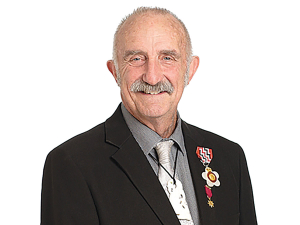Nestle reportedly withdraws from methane accord
The ACT Party says media reports that global dairy giant Nestle has withdrawn from the Dairy Methane Action Alliance shows why New Zealand needs to rethink its approach to climate.
 Far North District Council mayor John Carter made an undertaking in June to 'pause' the mapping of SNAs, and the council has now scrapped the idea completely.
Far North District Council mayor John Carter made an undertaking in June to 'pause' the mapping of SNAs, and the council has now scrapped the idea completely.
The Far North Council is dropping the contentious Significant Natural Areas (SNAs) mapping policy.
ACT primary industries spokesman and Ruawai farmer Mark Cameron has praised the mover.
He claims that private property rights are under threat due to the Government's directive to councils to identify and manage SNAs.
A protest meeting in Northland, in June, saw more than 500 people call on the council to drop the SNAs policy.
SNAs were brought in under the Resource Management Act in 1991, when councils were charged with identifying and protecting areas with significant habitats of indigenous biodiversity. Around 60% of councils have identified SNAs but the Government admits the work has not been done in a consistent way, due to lack of clarity.
That has led to loud opposition from farmers and iwi - with some councils having scrapped or shelved the process.
The Far North District Council voted recently to continue developing the content for the draft District Plan, but to remove SNA maps developed by ecologists from the document.
The council's strategy and policy committee chair Councillor Rachel Smith says the decision endorses an undertaking Mayor John Carter made in June to 'pause' the mapping of SNAs.
"This followed protests by tangata whenua, farmers and other landowners who said the proposal to identify land as SNAs undermined their sovereignty and property rights.
"This opposition culminated in a large hikoi to the Council' Kaikohe headquarters where tangata whenua delivered a petition against the process," she says.
"Our decision provides a clear way forward for our draft district plan, while acknowledging more direction is needed from central government on how to support landowners to protect significant species and habitats."
Cameron believes the council has done the right thing because the depth of feeling is clear.
"People are angry and worried about this policy," he claims. "SNAs undermine conservation efforts by the people who care most about the environment."
Cameron says farmers have the biggest incentive to care about the environment because they make a living from it.
"If you take away property rights, there's no incentive to be a conservationist. Who would be a conservationist on their own land if the reward is getting your land confiscated? Countries without property rights are environmental disasters," he adds.
"Actively punishing people if they loook after their wetlands is among the worst policies this Government has put in place."
Cameron says there is a better way.
"Landowners, councils and conservationists already work together to protect indigenous biodiversity. Instead of land grabs, the Government should be supporting these pre-existing efforts."
Fonterra’s impending exit from the Australian dairy industry is a major event but the story doesn’t change too much for farmers.
Expect greater collaboration between Massey University’s school of Agriculture and Environment and Ireland’s leading agriculture university, the University College of Dublin (UCD), in the future.
A partnership between Torere Macadamias Ltd and the Riddet Institute aims to unlock value from macadamia nuts while growing the next generation of Māori agribusiness researchers.
A new partnership between Dairy Women’s Network (DWN) and NZAgbiz aims to make evidence-based calf rearing practices accessible to all farm teams.
Despite some trying circumstances recently, the cherry season looks set to emerge on top of things.
Changed logos on shirts otherwise it will be business as usual when Fonterra’s consumer and related businesses are expected to change hands next month.

OPINION: Here w go: the election date is set for November 7 and the politicians are out of the gate…
OPINION: ECan data was released a few days ago showing Canterbury farmers have made “giant strides on environmental performance”.